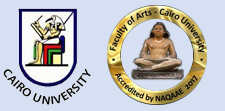عنوان المقال عربي
قصيدة المديح النبوي (صلى الله عليه وسلم) بين البوصيري وشوقي
Document Type
Original Study
Abstract English
The poem of praise of the Prophet began with defense of Islam, like what is existed in the poems of Hassan bin Thabit (may Allah be pleased with him), or an apology for what happened in the pre-Islamic era, like Lamiyt Kaab bin Zuhair (may Allah be pleased with him). In the Umayyad era, the poem of praise of the prophet was associated with the praise of the people of the house of prophet Muhammed (may Allah be pleased with them), Umayyad and Abbasid, Praise the people of the house of prophet Muhammed continued, lamenting for Al-Hussain bin Ali (may Allah be pleased with them), and praising them Praise continued in the Fatimid era, after collapse of the Fatimid state, Salah Al-Din kept the prophet's birthday from its feasts, which was a wonderful field for the prosperity of the poem of prophet's praise. We stop at Al-Busairi (606 - 698 A.H) Imam of eulogizers, and the author of ''The Blessed Burda'', he influenced by poets before him and influenced those who came after him, as a teacher to all eulogizers. In the modern era, we found Ahmed Shawqi composes three poems in praise of the Prophet (Allah bless him and grant him salvation) one of the best wonderful poems in praise. We stopped at the uniqueness of Shawqi's skill. He influenced by Al-Busairi, and surpassed his teacher, and he recognized for his precedency and ingenuity, when Al-Busairi says in his Burda: - Then travelled at night from one sacred place to another, just as the full moon travels through intenso darkness. Shawqi excels in emulation, and emerges from emulation to the new distinct artistic creativity, with a great talent for visualization, vocabulary selection and sentence formation, with the magic of the captivating musical melody: - God conveyed you by night to the Al-Aqsa Mosque, where his angels and messengers stood. With this artistic superiority, we see Shawqi's politeness with Al-Busairi, his teacher and the teacher of eulogizers: - Eulogizers and lovers of passion are subservient, to the owner of old wild Burda. - Allah is witness that I do not oppose him, who is opposing towards the great?
الملخص العربي
بدأت قصيدة المديح النبوي دفاعًا عن الإسلام، مثل ما جاء عند حسان بن ثابت (رضي الله عنه)، أو اعتذارًا عما بدر من جاهلية، مثل لامية کعب بن زهير (رضي الله عنه). في العصر الأموي اقترنت قصيدة المديح النبوي بمديح آل البيت (رضي الله عنهم)، وسارت کذلک عند المخضرمين من الأمويين والعباسيين، وتوالى المديح رثاءً للحسين بن علي (رضي الله عنهما). واتسع في عهد الدولة الفاطمية، وبعد انهيارها استبقى صلاح الدين من أعيادها المولد النبوي، ذلک الذي کان مجالًا لازدهار قصيدة المديح النبوي. ونقف عند البوصيري (606- 698ه) إمام المادحين، وصاحب (بردة المديح المبارکة)، وقد تأثر بمن قبله، وأثَّر فيمن بعده. وفي العصر الحديث وجدنا أحمد شوقي ينْظِم ثلاث قصائد في مدح الرسول (صلى الله عليه وسلم)، ووقفنا عند تميُّز صنعة شوقي، وقد تأثَّرَ البوصيريَّ، وفاقه، وهو المُجِلُّ لسبقه وبراعته؛ فحيث يقول البوصيريُّ في بردته: ســــرَيْتَ مِن حـــرَم ليــلا إلى حــرم کما سَــرى البدْرُ في داجٍ من الظُّلَم يتقدم شوقي مُعارضًا، ويخرج من مجرَّد المعارضة إلى الإبداعِ الفنيِّ الجديد المتميِّز، شعريَّةً في التصوير وانتقاء الألفاظ وبناء الجملة، مع سحر النغمِ الموسيقيِّ الآسِرِ: أســـرى بک اللهُ لـيلًا إذْ مـــلائــکُــه والرُّسْلُ في المَسجدِ الأقصَى على قدَم ومع هذا التفوُّقِ الفنيِّ نرى تأدُّب شوقي مع البوصيري أستاذه وأستاذ المادحين: المــــادِحُــون وأرباب الهـــوَى تَبَــع لصــاحِب البُردَة الفيْــحاءِ ذي الـقِـدَم اللهُ يشـــــــهَــدُ أنِّـــي لا أُعــارِضُــــــــه مَـنْ ذا يُعــارضُ صَــوْب العارِض العَـرِم
Recommended Citation
Al Shatti, Abdel Fattah Abdel Mohsen
(2021)
"Prophet's praise poem
Between al-Busiri and Shawqi,"
Journal of the Faculty of Arts (JFA): Vol. 81:
Iss.
2, Article 22.
DOI: https://doi.org/10.21608/jarts.2021.238250
Digital Object Identifier (DOI)
10.21608/jarts.2021.238250
Accept Date
2022-05-19
Publication Date
4-1-2021

